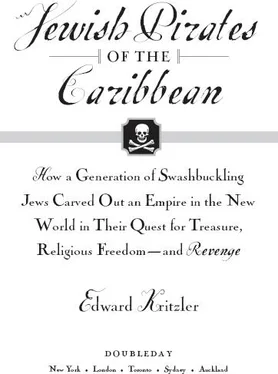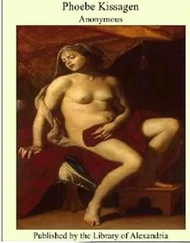Edward Kritzler - Jewish Pirates of the Caribbean
Здесь есть возможность читать онлайн «Edward Kritzler - Jewish Pirates of the Caribbean» весь текст электронной книги совершенно бесплатно (целиком полную версию без сокращений). В некоторых случаях можно слушать аудио, скачать через торрент в формате fb2 и присутствует краткое содержание. Год выпуска: 2008, ISBN: 2008, Издательство: Knopf Doubleday Publishing Group, Жанр: Старинная литература, на английском языке. Описание произведения, (предисловие) а так же отзывы посетителей доступны на портале библиотеки ЛибКат.
- Название:Jewish Pirates of the Caribbean
- Автор:
- Издательство:Knopf Doubleday Publishing Group
- Жанр:
- Год:2008
- ISBN:9780385528368
- Рейтинг книги:3 / 5. Голосов: 1
-
Избранное:Добавить в избранное
- Отзывы:
-
Ваша оценка:
- 60
- 1
- 2
- 3
- 4
- 5
Jewish Pirates of the Caribbean: краткое содержание, описание и аннотация
Предлагаем к чтению аннотацию, описание, краткое содержание или предисловие (зависит от того, что написал сам автор книги «Jewish Pirates of the Caribbean»). Если вы не нашли необходимую информацию о книге — напишите в комментариях, мы постараемся отыскать её.
Jewish Pirates of the Caribbean — читать онлайн бесплатно полную книгу (весь текст) целиком
Ниже представлен текст книги, разбитый по страницам. Система сохранения места последней прочитанной страницы, позволяет с удобством читать онлайн бесплатно книгу «Jewish Pirates of the Caribbean», без необходимости каждый раз заново искать на чём Вы остановились. Поставьте закладку, и сможете в любой момент перейти на страницу, на которой закончили чтение.
Интервал:
Закладка:
32. Robert P. Tristram Coffin, The Dukes of Buckingham: Playboys of the Stuart World (New York: Macmillan, 1931), 73.
33. García-Arenal and Wiegers, A Man of Three Worlds, 92–93.
34. Ibid., 87: When Sidan thought the Dutch were going over to Mahalli and he was near to losing his kingdom, he had Samuel offer Medina Sidonia the Mediterranean port town of La Mamoa in exchange for military support. When the duke passed the offer on to Philip, the king, suspecting Samuel was a double agent, told the duke not to deal with him.
35. Ibid., 80–82.
36. J. A. J. Villiers, “Holland and Some of Her Jews,” Jewish Review 7 (1912), 10–12: The day after the funeral, the States General noted: “His Excellency [Prince Maurice], and the State Council accompanied the body of Senor Samuel Palache, Agent of the King of Barbary, as far as the bridge in the Houtstraat.”
37. García-Arenal and Wiegers, A Man of Three Worlds, 62.
38. Bloom, The Economic Activities of the Jews, 14, 15n70: “Six months after the demise of Palache his nephew, Moses representing the estate sold two Torah scrolls to Neve Shalom for 1,000 guilders.”
Chapter Five: Amsterdam, the New Jerusalem
1. On the 1605 pardon, see H. P. Salomon, Portrait of a New Christian, Fernão Álvares Melo, 1569–1632 (Paris: Fundação Calouste Gulbenkian, Centro Cultural Portugués, 1982), 43–46; Wiznitzer, Jews in Colonial Brazil , 33–34: “The assessment of 1,700,000 cruzados was divided among all the New Christians of Portugal…And New Christians could not leave Portugal without proving that they had paid their part of the assessment or given the necessary guarantee for its payment…After the expiration of its one year term, the Holy Inquisition resumed the prosecution of Judaizers among the New Christians…any New Christian who tried to leave port without paying the assessment was to forfeit his possessions in favor of the crown. And the person denouncing the offender was to receive one third of the recovered proceeds.”
2. Benjamin Arbel, Trading Nations: Jews and Venetians in the Early Modern Eastern Mediterranean (New York: E. J. Brill, 1995), 180–81; H. I. Bloom, The Economic Activities of the Jews in Amsterdam in the 17th and 18th Centuries (Williamsport, Pa.: Baynard Press, 1937), 93n70: The Spanish had a different explanation for aliases. In 1654 the Spanish consul in Amsterdam wrote the Spanish ambassador: “The president of the Synagogue signs himself Cortez instead of Corticos,…his real name…It is the custom of members of his nation to take as many names as they please,…so as not to jeopardize their parents or relatives who are known by the name in Spain.” Daniel Swetschinski, “The Portuguese Jews of 17th Century Amsterdam: Cultural Continuity and Adaption,” in Essays in Modern Jewish History, ed. Frances Malino and Phyllis Cohen Albert (Rutherford, N.J.: Fairleigh Dickinson University Press, 1985), 58–60: Ninety-one percent of the community men were named after patriarchs. The favorite first names (in order of preference) were Abraham, Isaac, David, Moses, Joseph, Samuel, Aaron, Benjamin, Solomon, Daniel, and Emanuel.
3. Joachim Prinz, The Secret Jews (New York: Random House, 1973), 70–74.
4. Seymour B. Liebman, The Jews in New Spain (Miami: University of Miami Press, 1970), 589; Gerber, Jewish Society in Fez, 63; Jan Stoutenbeek and Paul Vigeveno, A Guide to Jewish Amsterdam (De Haan: Jewish Historical Museum, 1985), 13: In 1616, Jews were forbidden “physical communion with Christian wives or daughters in or outside the state of marriage even though these women themselves might be of bad reputation.” Bloom, Economic Activities of the Jews, 20: In 1616, Jews were forbidden to employ Christian servants.
5. Graetz, History of the Jews, vol. 4, 57.
6. Prinz, The Secret Jews, 74: In 1660, Isaac Orobio de Castro described the situation in Amsterdam. “There are those…who undergo circumcision as soon as they arrive, love God’s law and are eager to learn that which they and their ancestors had forgotten during their years of their imprisonment…There is another group who indulge in the idolatry of logic…they are full of vanity, haughtiness and a sense of superiority because they believe they know everything…They place themselves under the happy yoke of Judaism…but their vanity and so-called superiority prevents them from accepting our teachings…The trouble is that the young…admire them and follow suit. They all land quickly in the abyss of atheism and apostasy.”
7. Odette Vlessing, “Samuel Palache: Earliest History of Amsterdam Portuguese Jews,” in Dutch Jewish History , vol. 3 (Jerusalem: The Institute for Research on Dutch Jewry, 1993), 52.
8. Simon M. Schama, “A Different Jerusalem: The Jews in Rembrandt’s Amsterdam,” in The Jews in the Age of Rembrandt, ed. Susan Morgenstein and Ruth Levine (Rockville, Md.: The Judaic Museum of the Jewish Community Center of Greater Washington, 1981), 3.
9. Swetschinski, “Conflict and Opportunity in Europe’s Other Sea: The Adventure of Caribbean Jewish Settlement,” American Jewish Historical Society (December 1982), vol. 2, 216–17: “Old Christian Portugal traditionally disdained the mercantile profession…It was therefore natural for many New Christian outcasts to assume a position in that segment of Portuguese society that was numerically understaffed and socially underrated…New Christians constituted about 65%–75% of the total Portuguese mercantile community while hardly totaling more than 10% of the population.”
10. John J. Murray, Amsterdam in the Age of Rembrandt (Norman: University of Oklahoma Press, 1967), 49.
11. Schama, “A Different Jerusalem,” 8: “There was a willingness to use Jews in high risk areas of the economy where more prudent or nervous investors were reluctant to venture.” Jews were only let in on Holland’s more speculative ventures like invading the New World and attacking the Spanish silver fleet. When these paid off the brothers were set, big-time: on page 642 Schama quotes Elie Luzac, The Wealth of Holland, vol. 1 (1778), 63, 501: “It was only in 1612, in imitation of certain Jews who had taken refuge among them, and who had it was said set up counting houses everywhere, that the Dutch began to set up their own and to send their ships all over the Mediterranean.”
12. Vlessing, “Samuel Palache,” 53.
13. Ibid., 54, 62–63: From the time they entered Amsterdam, Jewish merchants dominated the sugar trade. In an address to the States General, Amsterdam’s Portuguese merchants wrote: “During the 12 year truce, thousands of cases of sugar were brought each year to Holland in our ships…shipping and commerce increased so considerably that each year 12 to 15 ships were built and added to the trade…We were so successful that we drove all the Portuguese caravels that used to carry the sugar from these waters.” The merchants wrote of other benefits Holland derived from their trade with Brazil: “The greatest benefit gained from this trade, namely, the sugar refineries…increased from three or four, 25 years ago, to 25 in Amsterdam alone, supplying Holland with sugar [as well as] France, England, Germany, and the East.” Cornelis Ch. Goslinga, The Dutch in the Caribbean and on the Wild Coast 1580–1680 (Asen, the Netherlands: Von Gorcum, 1971), 149: During the truce, the Dutch-Portuguese link controlled as much as two-thirds of the Brazilian trade with Europe.
14. Jonathan I. Israel, “The Changing Role of the Dutch Sephardim in International Trade, 1595–1715,” in Dutch Jewish History, vol. 1, ed. Jozeph Michman (Jerusalem: Tel Aviv University, 1984), 33: “Dutch Sephardim overseas commerce is characterized by the primacy of dealings with Portugal and its colonies…via Lisbon.”
Читать дальшеИнтервал:
Закладка:
Похожие книги на «Jewish Pirates of the Caribbean»
Представляем Вашему вниманию похожие книги на «Jewish Pirates of the Caribbean» списком для выбора. Мы отобрали схожую по названию и смыслу литературу в надежде предоставить читателям больше вариантов отыскать новые, интересные, ещё непрочитанные произведения.
Обсуждение, отзывы о книге «Jewish Pirates of the Caribbean» и просто собственные мнения читателей. Оставьте ваши комментарии, напишите, что Вы думаете о произведении, его смысле или главных героях. Укажите что конкретно понравилось, а что нет, и почему Вы так считаете.












